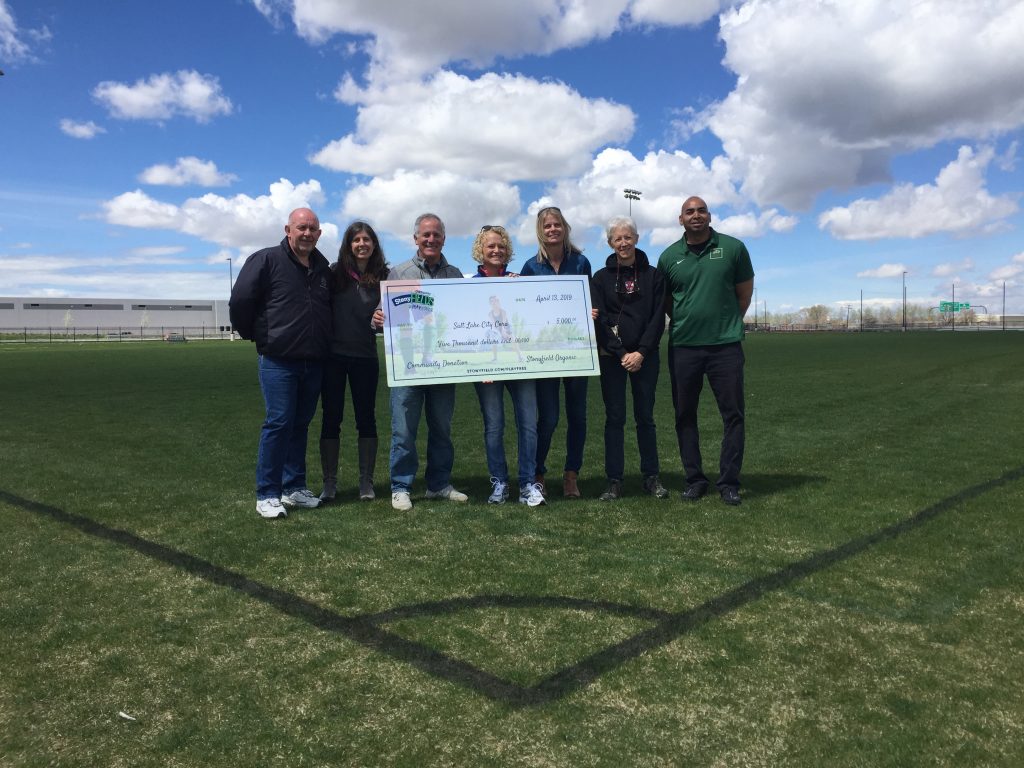Overview
In 2017, in partnership with Salt Lake City Public Lands, the Sustainability Department began a grant-funded multi-year pilot project of organic turf management methods at Madsen Park and Laird Park.
The goal was to test whether organic turf management products and processes could meet the needs of maintaining landscape health and visual standards on our properties within existing budget and personnel constraints.
Two-thirds of each park was treated with new organic products, while the other third functioned as a control area for comparison. The control area received applications of existing traditional products.
The organic land management pilot built on the work the Parks Division has already implemented through its best management practices with their integrated pest management plan. (Read more about current landscape practices here).
Timeline & Process for Organic Land Care
- The first phase of the project focused on improving soil health with an organic product applied in May, July, and September using a sprayer.
-
In fall and spring, additional organic fertilizer and weed suppression treatments were applied.
Given the success of the pilot at Laird and Madsen, in 2019, Salt Lake City announced that one field at Westpointe Park, and two fields at the Regional Athletic Complex would also be added to the pilot to test organic turf management, thanks to a donation from Stonyfield Organic.
Due to COVID-19, Public Lands was unable to apply the organic product to the test pilot park sites. This meant there was enough product to apply during the 2021 season to those sites. The pilot concluded at the end of the 2021 season.
Conclusion- 2021
These are the findings from Public Lands on the organic turf management pilot:
Pros:
- Public Lands found that watering correctly, improving soil structure, and seeding to build a strong turf is the most important aspect of keeping a healthy turf for play on fields.
- The pilot helped them look at other products and find better solutions other than routinely spraying herbicides.
- Added organic amendments helped the turf grow and have a longer longevity.
- Turf quality was maintained, but required more labor along with the organic product.
Cons:
- It is expensive to purchase the organic products. The organic product costs 2.5 times more than the traditional method of using pre-emergent and fertilizers. An annual cost per acre to apply an organic product is $1,946. Traditional turf management costs $780 per acre.
- Mixing and applying four different organic products is labor-intensive. It would be better to find one product that can be applied as-is.
- There are specific weeds that are too resilient for the turf to choke out. Those weeds needed to be pulled manually or sprayed with other means so they do not take over the turf.
Conclusion:
Public Lands concluded they will not pursue solely organic methods across their properties. They are not planning to stop using herbicides as they provide an inexpensive way to control undesirable weeds. However, the pilot helped them find new ways to amend soils and overseed with grass to maintain a strong vibrant turf. If the focus remains on keeping the turf vibrant and thriving, then herbicide application is minimal.
Long-term, more funding will need to be secured and a strategy developed to transition more Salt Lake City parks & playing fields to organic land care management.
Policy makers and the public will need to determine if this is a priority. If you would like to see further funding allocated to organic turf management, you may share your comments with publiclands@slc.gov, mayor@slc.gov, or your City Council member.

Salt Lake City staff and Mayor Jackie Biskupski receive a donation from Stonyfield Organic CEO Gary Hirschberg to support the piloting of two fields at the Regional Athletic Complex and one field at Westpointe park to organic land care methods. April 13, 2019.